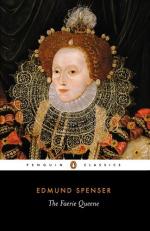405. OF GLORIANE, Queen Elizabeth.
407. CLEOPOLIS IS RED, is called Cleopolis, i.e. the city of Glory, or London.
425. MY DOLEFULL DISADVENTUROUS DEARE, my sad misadventurous injury.
429. THAT HE MY CAPTIVE LANGUOR, the languishing captivity of my parents.
432. MY LOYALTY, i.e. the loyalty of me that rather death desire, etc.
441. THAT BROUGHT NOT BACKE, etc., (and whence) the body full of evil was not brought back dead.
QUESTIONS AND TOPICS
(Canto VII)
1. Relate how the Knight fell into the hands of the Giant. 2. Note the fine adaptation of sound to sense in vii. 3. Who were the parents and the foster-father of Orgoglio? 4. What are the principal characteristics of the giants of romance as seen in Orgoglio? cf. with the giants in Pilgrim’s Progress. 5. In the description of the giant do the last two lines (viii) add to or detract from the impression? Why? 6. To whom does Spenser ascribe the invention of artillery? 7. Explain the allegory involved in the relations of Duessa and Orgoglio. 8. How does Una act on hearing the news of the Knight’s capture? 9. What part does the Dwarf play? 10. Is Una just to herself in ll. 200-201? 11. Is she over sentimental or ineffective—and is the pathos of her grief kept within the limits of the reader’s pleasure? 12. Express in your own words the main thought in xxii. 13. Note the skillful summary of events in xxvi, and observe that this stanza is the Central Crisis and Pivotal Point of the whole Book. The fortunes of the Knight reach their lowest ebb and begin to turn. The first half of the Book has been the complication of the plot, the second half will be the resolution. 14. Give a description of Prince Arthur. 15. What mysterious power was possessed by his shield? Cf. the Holy Grail. 16. Observe carefully the scene between Una and Arthur, noting the changes in her mood. What light is thrown on her character? What are her feelings toward the Knight? 17. Explain the various threads of allegory in this Canto.
CANTO VIII
I. The Plot: Prince Arthur and Una are conducted by the Dwarf to Orgoglio’s Castle. At the blast of the Squire’s horn the Giant comes forth attended by Duessa mounted on the seven-headed Beast. In the battle which ensues Arthur wounds the Beast, slays the Giant and captures Duessa. Prince Arthur finds the Redcross Knight half starved in a foul dungeon and releases him. Duessa is stripped of her gaudy clothes and allowed to hide herself in the wilderness.
II. The Allegory: 1. Magnificence, the sum of all the virtues, wins the victory over Carnal Pride, and restores Holiness to its better half, Truth. With the overthrow of Pride, Falsehood, which is the ally of that vice, is stripped of its outward show and exposed in all its hideous deformity.




